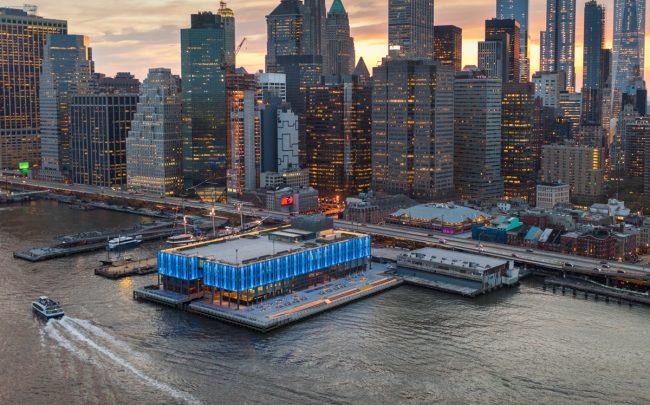After exploring a sale or spinoff for months, Texas-based Howard Hughes Corporation has decided to change CEOs and refocus on its core business. But its effort to redevelop the South Street Seaport continues to weigh down the struggling developer, leaving the future of that project in doubt.
In addition to replacing CEO David Weinreb with former Central Region President Paul Layne, Howard Hughes announced last week that it would sell about $2 billion of “non-core assets” — including 85 South Street in New York — and focus on the company’s core “master planned communities.”

Aerial views of Howard Hughes Corporation’s redevelopment of Pier 17 (Credit: Getty Images)
“The Seaport district remains an important part of the Howard Hughes Corporation,” chief financial officer David O’Reilly said on a call with investors last week. “While we appreciate the challenges of the complexity of an asset like this, we still believe that there is a clear, near-term roadmap to unlocking value, and intend to continue to execute on that strategy through 2020 and 2021.”
Whether it can sell others on the Seaport’s potential is an open question.
“As the Seaport is closer to achieving a critical mass of offerings, the company will consider partnering with third parties to reduce its equity commitment,” he continued, noting that further details regarding the firm’s Seaport strategy would be revealed on the firm’s third-quarter earnings call November 5.
Howard Hughes took on the Seaport development site through a long-term ground lease with the city in 2010 and has since invested $600 million to redevelop the area. In July, soon after plans for a possible sale became known, the firm refinanced the project with a $250 million loan package from a group of Korean institutions.
The company reached out to 35 investors during the sales process, including private equity firms, sovereign wealth funds and large family offices, chairman Bill Ackman said on the call. Seven of the eight that did in-depth due diligence for a possible sale concluded that they did not have sufficient capital for a deal. The intentions of the eighth investor remain unclear, according to Ackman.
The eight-story rental property at 85 South Street, one of the non-core assets Howard Hughes is selling, had been acquired for $20 million from Ralph Tawil’s Centurion Realty in 2014 in an off-market deal.
The developer, which was spun off from General Growth Properties in 2010, has faced local backlash throughout its attempt to overhaul the site. In the latest kerfuffle, a parking lot at 250 Water Street is suspected of having mercury beneath the asphalt.

